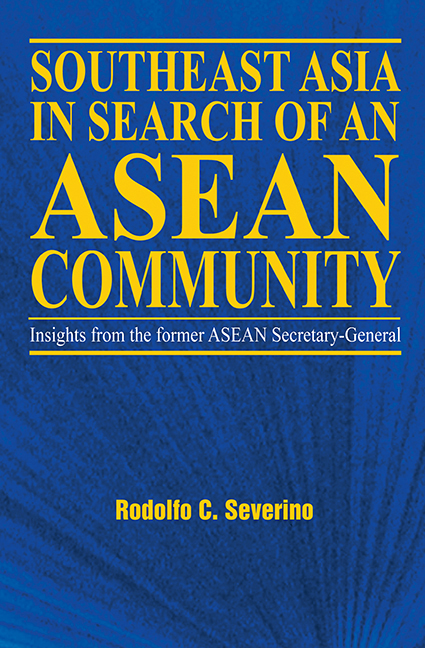Book contents
- Frontmatter
- Contents
- Foreword
- Introduction
- About the Author
- Acknowledgements
- Glossary
- 1 The “ASEAN Way”: Its Nature and Origins
- 2 Who Belongs in ASEAN? The Question of Membership
- 3 The Issue of Non-Interference
- 4 Regional Security: The ASEAN Role
- 5 Integrating the Regional Economy
- 6 ASEAN and the World
- 7 The ASEAN Community: Is It for Real?
- 8 What Kind of Future for ASEAN?
- Appendices
- Interviews
- Index
4 - Regional Security: The ASEAN Role
Published online by Cambridge University Press: 21 October 2015
- Frontmatter
- Contents
- Foreword
- Introduction
- About the Author
- Acknowledgements
- Glossary
- 1 The “ASEAN Way”: Its Nature and Origins
- 2 Who Belongs in ASEAN? The Question of Membership
- 3 The Issue of Non-Interference
- 4 Regional Security: The ASEAN Role
- 5 Integrating the Regional Economy
- 6 ASEAN and the World
- 7 The ASEAN Community: Is It for Real?
- 8 What Kind of Future for ASEAN?
- Appendices
- Interviews
- Index
Summary
Many people have come to assume that, from the beginning, the Association of Southeast Asian Nations has been devoted principally to economic, social and cultural cooperation. In fact, ASEAN itself has often, deliberately or unwittingly, given that impression. In substance, however, security has been and largely remains at the core of ASEAN's existence; indeed, in today's comprehensive concept of security, as well as in the original conception of ASEAN, regional economic cooperation and integration is seen as part of the endeavour to bolster regional security through economic development, even as security is regarded as an essential condition for development.
The text of the ASEAN Declaration that founded the association places heavy emphasis on economic, social and cultural cooperation. Five of the seven “aims and purposes” laid down by the Declaration for the new association refer to cooperation in economic, trade, social, cultural, professional, educational, technical, agricultural, industrial, transportation, communications, and administrative matters. Another objective urges “cooperation with existing international and regional organizations with similar aims and purposes”. The reference to regional security was deliberately muted in order to dispel the notion that ASEAN was intended to be some kind of defence pact or military alliance, even a replacement or surrogate for the Southeast Asia Treaty Organization, or SEATO, as the Soviets and the Chinese were to charge and as the association's founding members, particularly Indonesia, wanted precisely to avoid. The lone item in the ASEAN Declaration's “aims and purposes” that refers to regional security calls only for the promotion of “regional peace and stability”, not through any kind of cooperation or joint action, but “through abiding respect for justice and the rule of law in the relationship among countries of the region and adherence to the principles of the United Nations Charter”.
Nevertheless, it is clear from the circumstances at the time and the statements of the founding statesmen that their central pre-occupation was regional security even if only as a condition for development — and vice versa. When after the massive upheaval in Indonesia in 1965–66 General Soeharto took over the country's leadership from President Sukarno, the New Order had two basic objectives — the development of Indonesia's ravaged economy and the end of the confrontational stance and policies in its foreign relations.
- Type
- Chapter
- Information
- Southeast Asia in Search of an ASEAN Community , pp. 161 - 211Publisher: ISEAS–Yusof Ishak InstitutePrint publication year: 2006

